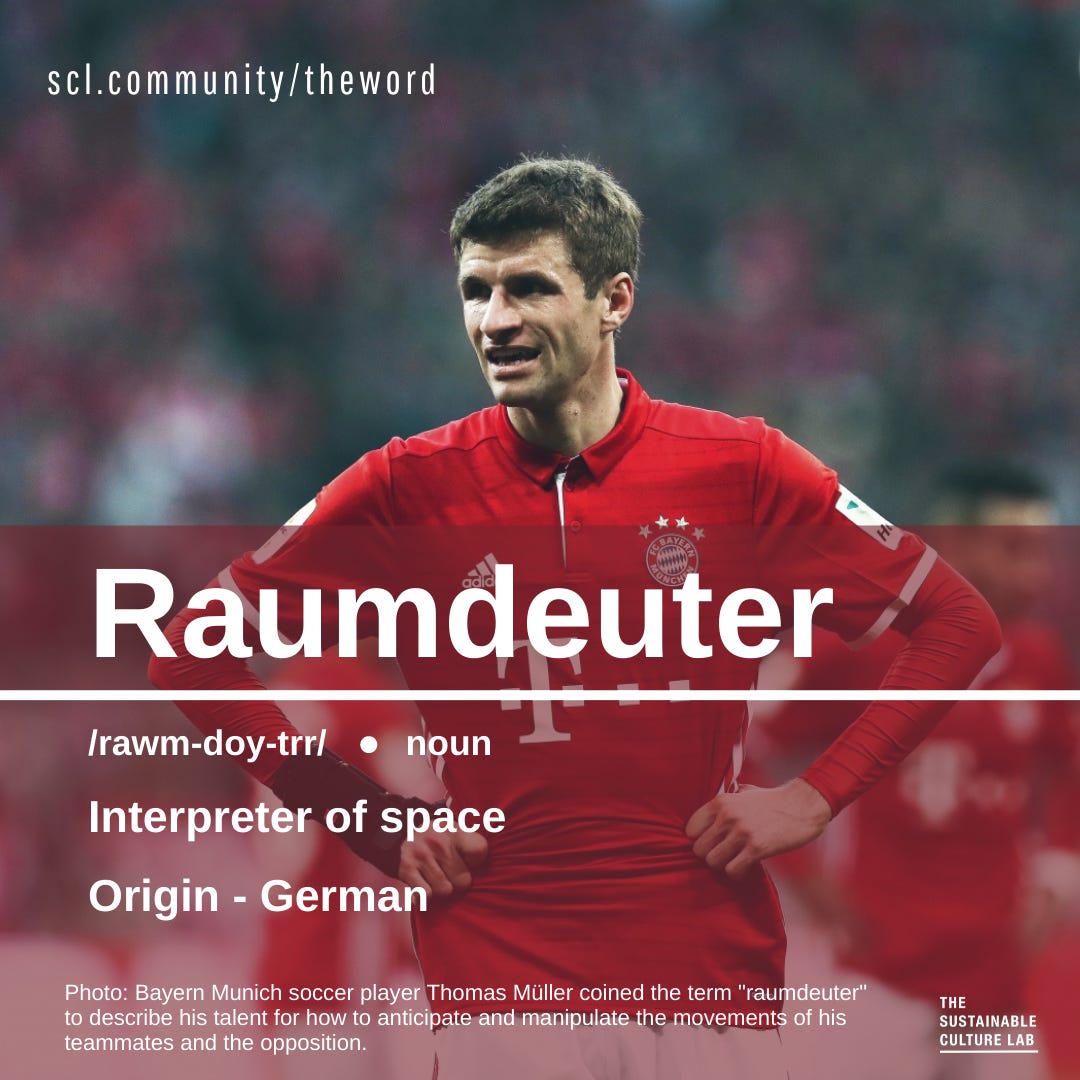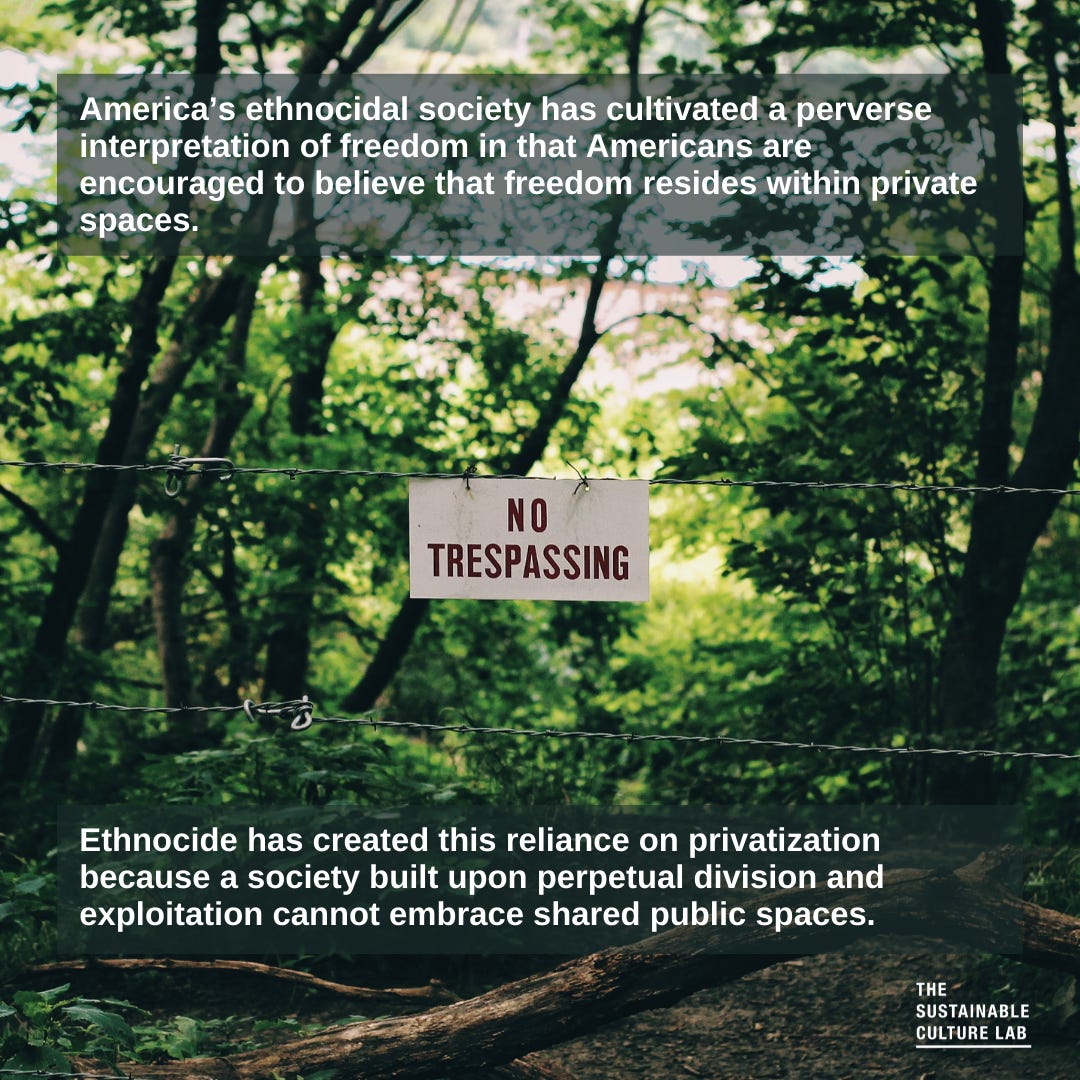Raumdeuter • noun • (rawm-doy-trr)
Definition: Interpreter of space
Origin: German
To help sustain and grow The Word with Barrett Holmes Pitner we have introduced a subscription option to the newsletter. Subscribers will allow us to continue producing The Word, and create exciting new content including podcasts and new newsletters.
Subscriptions start at $5 a month, and if you would like to give more you can sign up as a Founding Member and name your price.
We really enjoy bringing you The Word each week and we thank you for supporting our work.
My book THE CRIME WITHOUT A NAME was released last week on October 12, 2021!
The book has received glowing reviews and Publishers Weekly says that THE CRIME WITHOUT A NAME is one of the top books of Fall 2021.
On Friday Literary Hub published an excerpt and you can read it here!
You can order the book—including the audiobook—at thecrimewithoutaname.com.
This week's word comes to us from the world of professional soccer and speaks to the importance of equitably and efficiently using shared space in order to cultivate freedom.
Thomas Müller is one of the best soccer players in the world, but few people have heard of him outside of soccer aficionados, and most intriguingly, it is very difficult to describe how Müller is such a good soccer player.
Müller plays for Bayern Munich and the German national team, and with both teams he has won almost every trophy available. The only noteworthy trophy eluding his grasp is the European Championship. His career has spanned more than a decade and he has been an integral part of both teams success. Yet despite being an attacking player who regularly contributes decisive goals and assists, Müller hardly resembles a talented soccer player.
Müller has an awkward running style, and he rarely dribbles past defenders. His goals are rarely aesthetically pleasing and half the time it appears as though he has kicked the ball incorrectly. He is a gangly, awkward player who appears to not know how to kick a soccer ball, yet more often than not he is the best player on the field.
Observers have long struggled to articulate why Müller is such a good player, so to assist baffled onlookers, Müller coined a word to describe his talent. Müller describes himself as a raumdeuter, which translates into English as “interpreter of space.”
Müller’s talent is that he always finds a way to be wide open. He does not need to be fast, strong, a great dribbler, or even a great striker of the ball if he is always wide open. In other words, Müller’s talent consists of knowing how to anticipate and manipulate the movements of his teammates and the opposition so that he always has enough time and space to make the right decisions.
Müller’s capacity to interpret space gives him the freedom, responsibility and time to make good choices. He rarely panics, or appears nervous or anxious. His ability to always find space allows him to remain calm and confident, and his disposition makes him a calming influence in his team and a great leader.
Müller’s application of raumdeuter may most noticeably reside on the soccer field, but we all should practice becoming positive interpreters of space as we confront the dizziness of freedom.
Private vs. Public Space
As we have discussed before, America’s ethnocidal society has cultivated a perverse interpretation of freedom in that Americans are encouraged to believe that freedom resides within private spaces.
In America, private property is depicted as an American’s sanctuary, and exclusive domain where they are allowed to be free. The American credo of “Life, Liberty and the Pursuit of Happiness” articulated by Thomas Jefferson is merely a modification of the philosophy of John Locke that proclaimed “Life, Liberty and Property” as the foundation of freedom. Property and the pursuit of happiness have now become interchangeable, and essential pillars for obtaining freedom in America.
Much of American society is built around encouraging privatization and defending property so that Americans can pursue what we consider to be “freedom.” Home ownership has long been used as an indicator of the health of the American economy and society, and in many states in America it is perfectly legal to use lethal force to defend property using the language of “stand your ground” laws to enshrine these ethnocidal rights.
Ethnocide has created a reliance on privatization because a society built upon perpetual division and exploitation cannot embrace shared public spaces. The equitable sharing of space would undermine ethnocide, and destroy the “freedom” of the ethnocider to exploit the ethnocidee. A freedom based on equality and shared public spaces equates to the antithesis of ethnocide. Therefore, an ethnocidal society champions the freedom of the private spaces in which the ethnocider lives.
This is why America embraces private spaces. Our society has an unhealthy interpretation of space.
Our unhealthy interpretation of space is noticeable everywhere you look. Since American freedom and space derives from domination and privatization, we do not have a cultural desire to efficiently or equitably use space. Instead Americans more often than not aspire to occupy space, claim it as their private domain, and then exercise their “freedoms” however they want. Cultivating freedom via equitably sharing and efficiently using space is not part of our mindset.
Gentrification is a great example of how to talk about ethnocide and the lack of value placed on being a raumdeuter in America. One of the major frustrations with gentrification is that the gentrifiers who move into neighborhoods of color have no desire to become a part of the existing community. Their freedom and happiness does not come from the shared communal spaces of the community, but rather from the private property they have purchased. More often than not, gentrifiers do not have malicious intent, but their interpretation of freedom and space derives from ethnocide. Their pursuit of freedom and happiness cultivates division and inequality.
Additionally, they believe that the injection of money and increased privatization that gentrification brings actually equates to bestowing freedom and opportunity upon their new community. The tension of gentrification derives from conflicting interpretations of freedom and space.
Constructive vs. Destructive Language
Throughout The Word we have used a fair amount of German words because of the constructive nature of that language. In German, people are encouraged to create words to fill a linguistic void, and often these new words are created so that people can articulate a previously unimaginable manifestation of success — raumdeuter is one of these words.
In an earlier newsletter, we introduced nervenstärke which means, “nerve strength.” Thomas Müller’s teammate at Bayern Munich, Manuel Neuer, reinvented the role of the goalkeeper due to his nervenstärke. Neuer practiced and specialized in keeping his nerve and focus during soccer matches to such a previously inconceivable extent that he attempted maneuvers that had long been considered impossible.
Despite goalkeepers being able to use their hands, Neuer is just as good with his feet as a field player, and due to this, he often plays as an additional defender. He races out of his goal and wins tackles. He takes risks where one mistake could result in a goal. Before Neuer, these actions would make goalkeepers too nervous, so they would not attempt them. But Neuer learned how to keep his nerve and now he could consistently execute actions that used to be considered impossible. Today, all top goalkeepers try to play with nervenstärke.
A constructive language empowers people to create language to transcend the status quo, yet America’s ethnocidal discourse often encourages a destructive language.
In American English, we are encouraged to use destructive language to articulate success, and people rarely feel empowered to create new words.
Saying that you “killed it” or “crushed it” are common expressions to denote success in America. The magic answer to our problems is commonly called a “silver bullet,” and efficiently solving problems is called “killing two birds with one stone.” Losing a competition is frequently described as “getting owned.” Ownership denotes domination and freedom in this discourse and it is inherently destructive.
Our destructive language speaks to our ethnocidal divisions. Our ethnocidal language not only manifests in the words we speak, but also the words we cannot even imagine creating because we fail to recognize our linguistic void.
Raumdeuter not only expresses a healthier interpretation of space than the divided, private space of America, but also the necessity of a constructive language so that we can articulate the new, unique manifestations of the shared, equitable, liberated space we aspire to create and thrive within.
Online Discussion at the New York Public Library about The Crime Without a Name
The Crime Without a Name: Barrett Holmes Pitner with Lewis R. Gordon
Date and Time: Thursday, October 21, 2021, 7 - 8 PM
End times are approximate. Events may end early or late.
Location: Online & the Stephen A. Schwarzman Building
Price: Free
RSVP: Here is the registration link.





